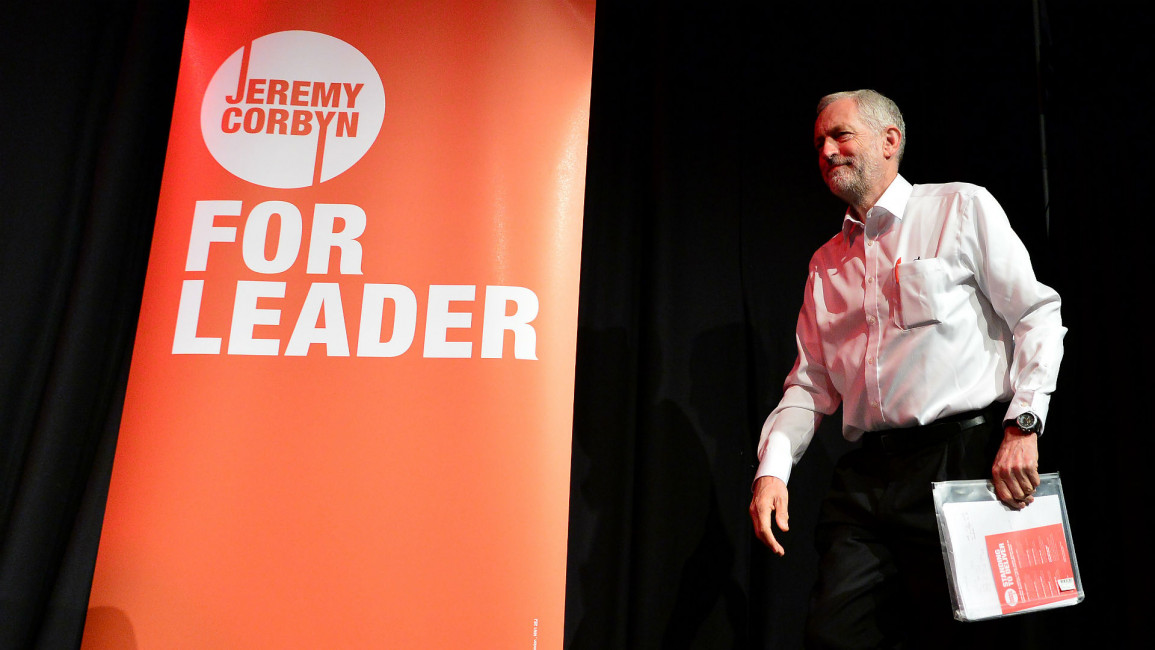
Hamas-Hizballah 'association' can't stop Corbyn surge
In the UK, the peace campaigning, left-wing Member of Parliament Jeremy Corbyn is building momentum in his campaign to be elected leader of the Labour party in the wake of its crushing defeat in the May general election.
Caught off-guard by Corbyn's surge in popularity, opponents have been lining up to try to discredit him and his record on Middle East issues. So far, the impact on his popularity seems negligible - and may even be having the opposite effect.
Those sounding the alarm bells about a Corbyn victory include architects of the disastrous and illegal invasion of Iraq: former Prime Minister Tony Blair, former Foreign Secretary Jack Straw, and spin doctor Alistair Campbell.
Seemingly unaware of their own profound unpopularity, they have joined with other right-wing commentators to attempt to derail a surge in enthusiasm for Corbyn that has captured the imaginations of large numbers of young people.
And with Corbyn, the Middle East is never far from the discussion.
Early in the leadership campaign, video emerged of Corbyn referring to "our friends from Hizballah" at a public event and expressing regret that members of Hamas had been unable to attend due to Israel blocking their travel.
Corbyn's opponents took up the early opportunity to attack him, and Corbyn was forced to defend his approach to Hizballah and Hamas, still commonly regarded as terrorist groups in the UK.
In a television appearance, Corbyn responded to the criticism in the straight-forward manner that has characterised his campaign: "I believe one should work with people with whom you don't agree - because just talking to people that you agree with isn't going to bring about a long-term settlement in the Middle East."
Corbyn explained that he'd met senior figures from Hizballah and Hamas, just as he met with Sinn Fein during the Troubles in Northern Ireland in the 1980s, as well as far-right Israeli parties, including Likud.
| With Northern Ireland, Corbyn was ultimately proved right |
With Northern Ireland, Corbyn was ultimately proved right, and few would argue any more that a complete exclusion of Hizballah and Hamas from talks will contribute to a just and lasting peace agreement.
However, any link to the resistance against Israel is politically potent - and Corbyn was pressed on Hamas' public statements on homosexuality. He responded that he remains completely opposed to homophobia - backed up by his support for gay rights long before it was acceptable, let alone popular, in the mainstream - and that he had expressed these views to Hamas.
Similarly, Corbyn explained that, on a delegation to Iran to discuss nuclear issues he "spent the whole week raising human rights issues with the Iranian government".
Engaged - and engaging
His opponents attempted to portray Corbyn as an apologist for repressive political movements, but Corbyn hasn't been cowed by this, stating: "You have to confront those attitudes, you can't run away from it."
Such convictions seem to have been working for Corbyn as his opponents remain unwilling to risk engaging in an in-depth debate on Middle East issues with a politician who has been proved right time and again on matters of war and peace in the region and has a far deeper understanding of the region than his opponents.
From his countless speeches, articles and interviews on the Middle East, the "friends from Hizballah" quote is the best Corbyn's opponents have so far been able to produce with which to smear him. A second chance to attack Corbyn came at a leadership debate held at a London Jewish community centre, where the issue of Israel almost totally dominated the agenda.
At the debate, the three other candidates, Andy Burnham, Yvette Cooper and Liz Kendall all sought to distance themselves from the UK parliament's 2014 vote to unilaterally recognise the state of Palestine.
Burnham stated that, as Labour leader his first foreign visit would be to Israel. Liz Kendall condemned the Boycott, Divestment and Sanctions movement, saying that, as leader she would "fight it with every fibre of my being".
As for Corbyn, he called for an arms embargo on Israel.
| So far, the mudslinging and guilt-by-association have failed to slow the momentum of Corbyn's campaign |
So far, the mudslinging and guilt-by-association have failed to slow the momentum of Corbyn's campaign. In fact, Corbyn's history of support for Lebanon and Palestine and his willingness to engage with all sides to achieve peace in the Middle East have probably given his campaign a significant boost.
With a one-member one-vote system being used by the party for the first time, Corbyn can take the leadership on a wave of popularity among Labour members and supporters. If he gains power, the full spectrum of the UK establishment will be gunning for him.
If UK politics continues to be dominated by money and corporate influence, Corbyn's Middle East activism may still be used against him. However, if the momentum of the movement he represents continues to build exponentially, UK politics may be rebalanced more towards the will of the people.
In such conditions, the prospect of a UK government making peace rather than war in the Middle East might yet become a reality.
Tom Charles is a London-based writer, editor and literary agent. He previously worked in the UK parliament, including as a lobbyist for Palestinian rights. He has contributed to Jadaliyya and the Journal of Palestinian Refugee Studies.
Opinions expressed in this article remain those of the author, and do not necessarily represent those of al-Araby al-Jadeed, its editorial board or staff.




